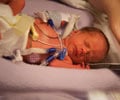A large international study has found that women who use marijuana can more than double the risk of giving birth to a baby prematurely.

A study of more than 3000 pregnant women in Adelaide, Australia and Auckland, New Zealand has detailed the most common risk factors for preterm birth. The results have been published online today in the journal PLoS ONE.
The research team, led by Professor Gus Dekker from the University of Adelaide's Robinson Institute Lyell McEwin Hospital, found that the greatest risks for spontaneous preterm birth included:
* Strong family history of low birth weight babies (almost six times the risk);
* Use of marijuana prior to pregnancy (more than double the risk);
* Having a mother with a history of pre-eclampsia (more than double the risk);
* Having a history of vaginal bleeds (more than double the risk);
* Having a mother with diabetes type 1 or 2 (more than double the risk).
The team also found that the greatest risk factors involved in the preterm rupture of membranes leading to birth included:
* Mild hypertension not requiring treatment (almost 10 times the risk);
* Family history of recurrent gestational diabetes (eight times the risk);
* Receiving some forms of hormonal fertility treatment (almost four times the risk);
* Having a body mass index of less than 20 (more than double the risk).
"Our study has found that the risk factors for both forms of preterm birth vary greatly, with a wide variety of health conditions and histories impacting on preterm birth," says Professor Dekker, who is the lead author of the study.
"Better understanding the risk factors involved in preterm birth moves us another step forward in potentially developing a test - genetic or otherwise - that will help us to predict with greater accuracy the risk of preterm birth. Our ultimate aim is to safeguard the lives of babies and their health in the longer term," he says.
Advertisement
Advertisement












